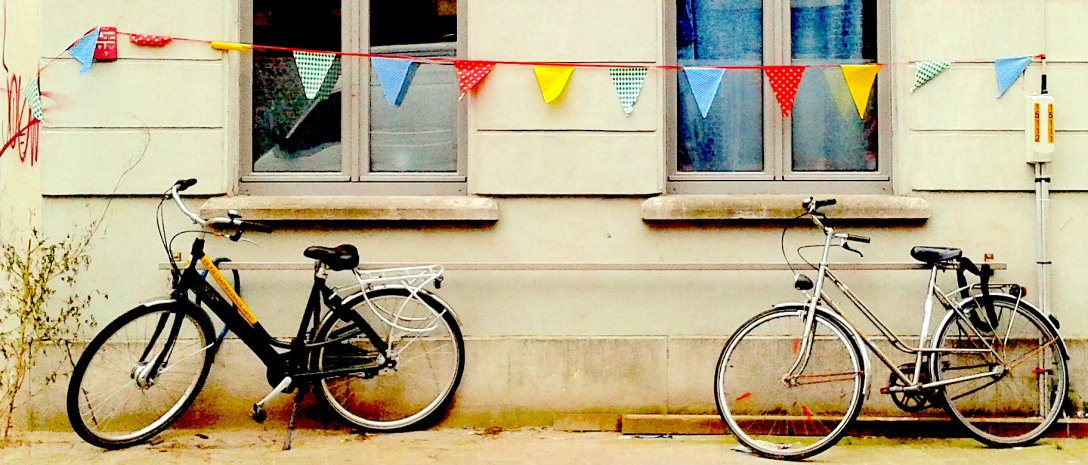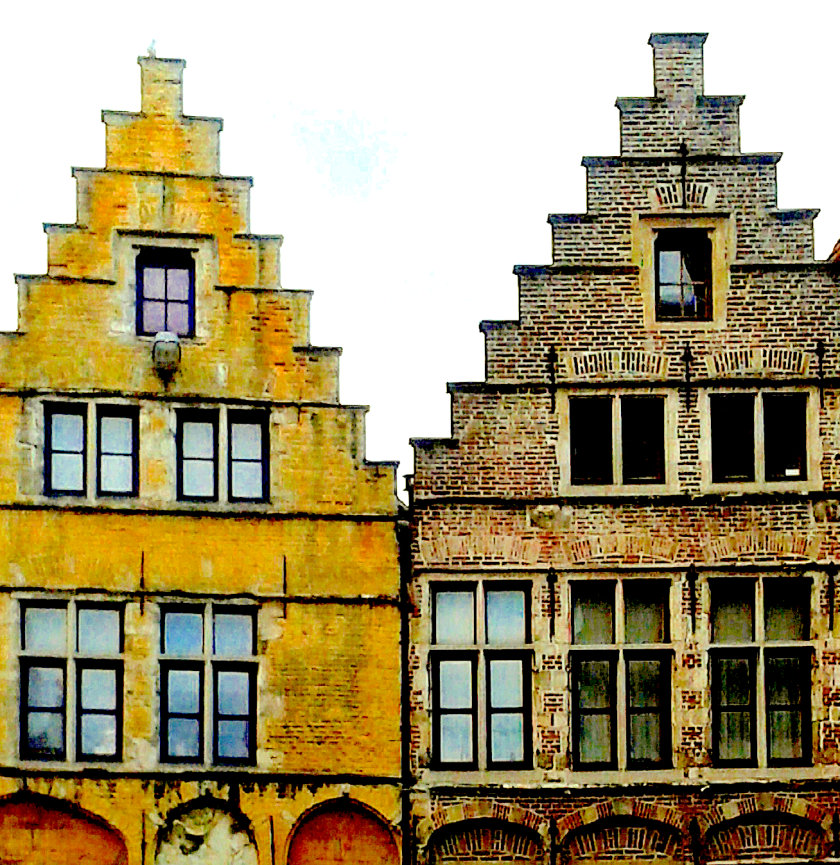
Photo by Chiara Certomà
CROWD_USG is a Marie Skłodowska-Curie research project by Chiara Certomà, exploring how increasing ICT-people interactions are transforming the governance of urban sustainability. In this page you will find information about the project, about Chiara Certomà and about the CDO at Ghent University. The official UGent page about the project is here.This information is intended both for citizens and researchers interested in the potential of crowdsourcing for advancing co-creative and participatory innovation networks toward just and sustainable urban development.
This project has received funding from the European Union’s Horizon 2020 research and innovation programme under the Marie Sklodowska-Curie Research Fellowship Programme, grant agreement No 740191. CROWD_USG was hosted by the Centrum voor Duurzame Ontwikkeling (Centre for Sustainable Development, CDO) of Ghent University.
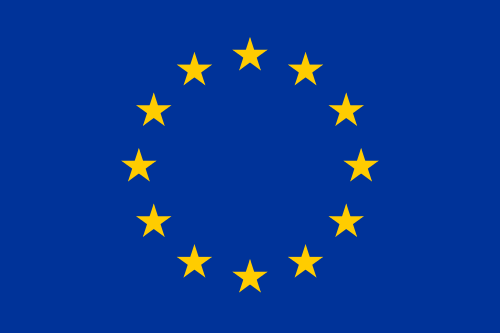
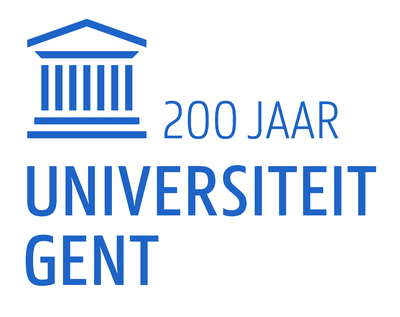
How can crowdsourcing processes affect the governance of urban sustainability? This is the key question CROWD_USG project focuses on.

In the recent decades cities attracted scholars and practitioners’ interest as the appropriate space for experimenting innovative strategies for urban sustainability governance, which requires a balance between environmental protection measures, social cohesion and the provision of democracy. Special attention is now devoted to the adoption of participatory approaches, and the interactive web has been often welcomed as a shortcut toward the democratisation of governance processes.
Particularly, crowdsourcing can impact on traditional governance model by reviewing the mode of interaction between governing bodies, research institutions, business and social actors. This can generate citywide technological leap-frogging and community-based decentralised knowledge and policy production systems; and can lead to the attainment of sustainability goals by fuelling the integration of environmental, social and economic priorities in the urban governance agenda. Ghent is a dynamic and innovation-oriented city, experimenting original solutions in sustainability governance, and aiming at pioneering green-infrastructure development, ethical and sustainable consumption and business models, ecosystem services valuing, and social cohesion and participation. Sitting on the critical geography tradition, CROWD_USG uses Actor-Network Theory and Scenario Building for modeling current material-semiotic fluxes in USG; and for prefiguring future social, political and economic development determined by the introduction of crowdsourcing processes. CROWD_USG project envisages:
- the exploration of current knowledge on the adoption of crowdsourcing processes for fuelling participatory governance processes and dealing with urban sustainability issues;
- the data collection and analysis of forefront applications in the city of Ghent, Belgium;
- the analysis of how technological agency can transform knowledge production and decision-making processes.
CROWD_USG @UGent H2020 repository
Presentation in Dutch
CROWD_USG is een Marie Sklodowska-Curie project van Chiara Certomà dat verkennend onderzoek doet naar de invloed van toenemende mens-ICT interactie op de governance modellen voor een stedelijke duurzaamheid. Op deze pagina vind je informatie over het project, over Chiara Certomà en over de gastinstelling, het CDO van de Universiteit Gent. Deze informatie is bedoeld voor burgers en onderzoekers die geïnteresseerd zijn in de mogelijkheden van crowdsourcing om co-creatieve en participatieve netwerken te bevorderen die betrekking hebben op complexe uitdagingen van stedelijke duurzaamheid.
Hoe kan crowdsourcing de governance van stedelijke duurzaamheid beïnvloeden? Dat is de centrale onderzoeksvraag van CROWD_USG. In de afgelopen decennia stonden steden in de belangstelling van academici en praktijkmensen als experimenteerruimte voor governance strategieën voor stedelijke duurzaamheid. Die governance modellen vereisen een evenwicht tussen milieubescherming, sociale cohesie en democratie en participatie. Daarbij worden de toepassing van participatieve processen en het interactief gebruik van het internet dikwijls verwelkomd als een binnenweg voor de democratisering van governance processen. In het bijzonder kan crowdsourcing de interactie tussen overheidsinstanties, academische wereld, bedrijfsleven en het maatschappelijk middenveld herzien of herijken. Daaruit kunnen stadsbrede sprongsgewijze technologische vooruitgang voortkomen, samen met gemeenschapsgerichte en gedecentraliseerde besluitvormingssystemen. Die verschillende systemen kunnen vervolgens de integratie van ecologische, sociale en economische prioriteiten in de stedelijke beleidsagenda bevorderen. Op die manier kunnen ten slotte duurzaamheidsdoelstellingen bereikt worden. Gent is een dynamische en innovatieve stad, waar geëxperimenteerd wordt met originele aanpak van het model voor duurzaamheidsgovernance. De stadsorganisatie van Gent wil een pioniersrol op zich nemen op het vlak van de ontwikkeling van groene infrastructuur, business modellen voor ethische en duurzame consumptie, het waarderen van ecosysteem diensten, het bevorderen van sociale cohesie en burgerparticipatie. In het kader van de kritische geografie hanteert CROWD_USG de Actor-Network Theory (van Latour) om de huidige materieel-semiotische stromen in de governance voor stedelijke duurzaamheid te modelleren. Bovendien gaat de benadering van de scenariobouw dienst doen als verbeelding van mogelijke toekomstige sociale en politieke ontwikkelingen die mee door de introductie van crowdsourcing worden bepaald.CROWD_USG voorziet in:
- Een brede verkenning van de huidige kennis over crowdsourcing in het kader van participatieve governance processen rond stedelijke duurzaamheidskwesties,
- De analyse van voorhoede toepassingen in de stad Gent, België,
- Een wetenschappelijk onderzoek over de manier waarop technologische competenties de besluitvormingsprocessen kunnen beïnvloeden,
CROWD_USG is te gast bij het CDO van de Universiteit Gent.
CROWD_USG PRESENTATION MATERIALS
CROWD_USG for public presentation at Digitale Week, 25th October 2017, Ghent Stadcrwodusg @digitale week (downloadable version here)
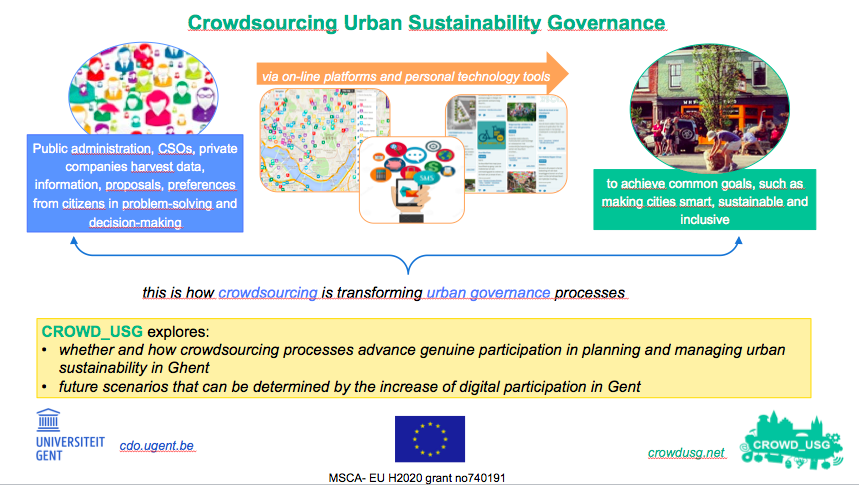
“Vuoi una città più verde? Clicca”mi piace” e condividi! Sostenibilità e partecipazione nel web interattivo” presentation at Bright Night of Researcher, 29th September 2017, Pisa
CROWD_USG in a nutshell, presentation at Bright Night of Researcher, 29th September 2017, Pisa
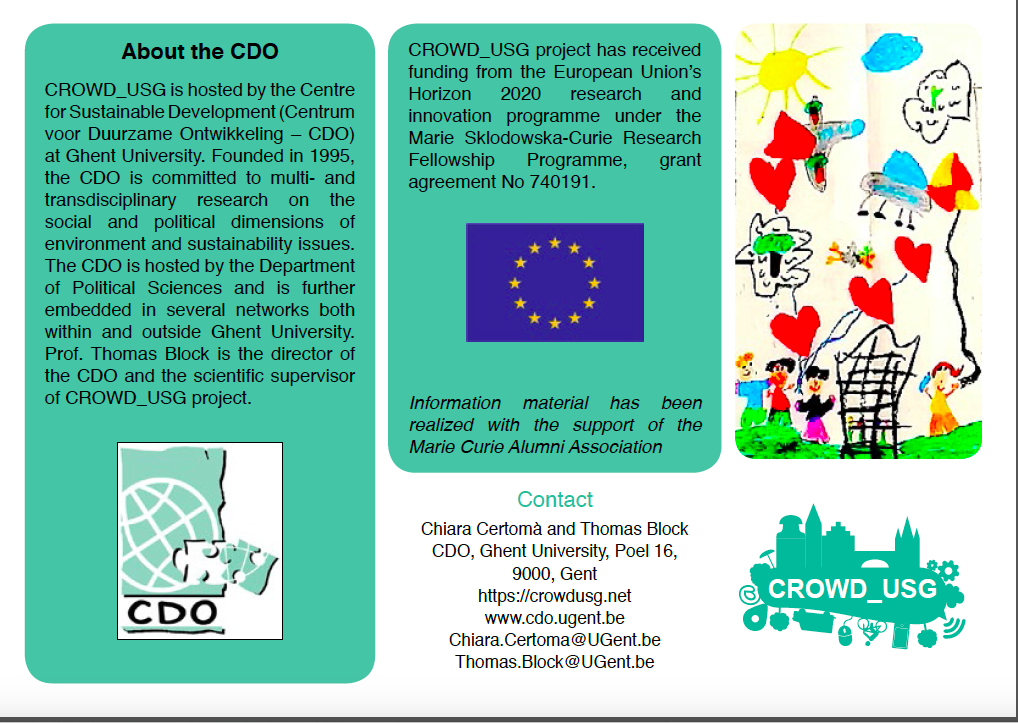
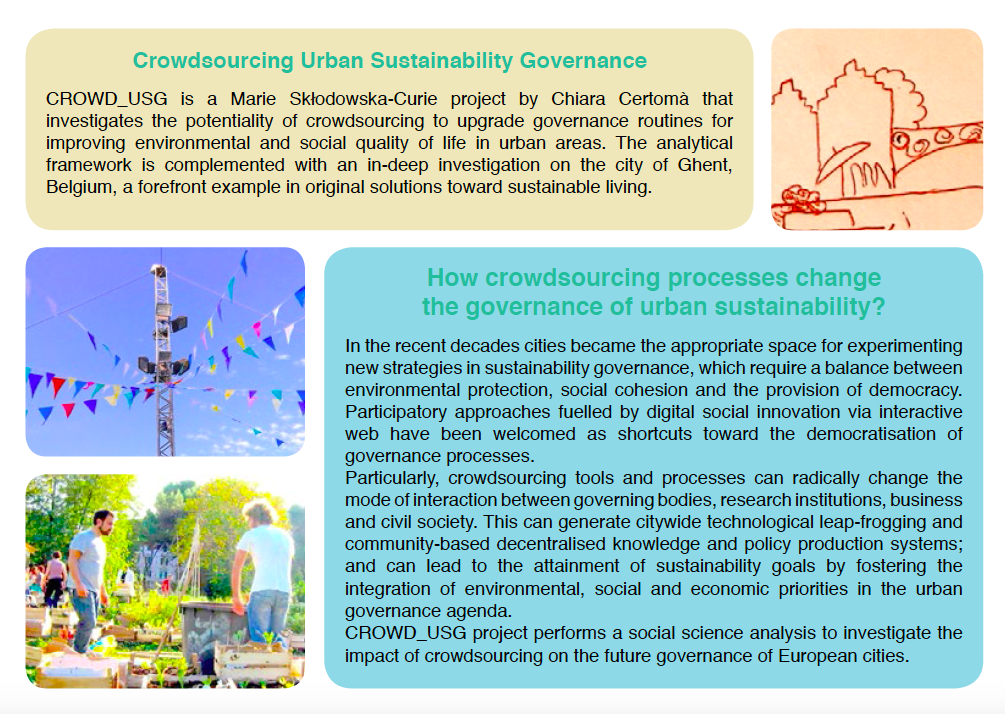
Download high resolution posters here: Poster 1; Poster 2

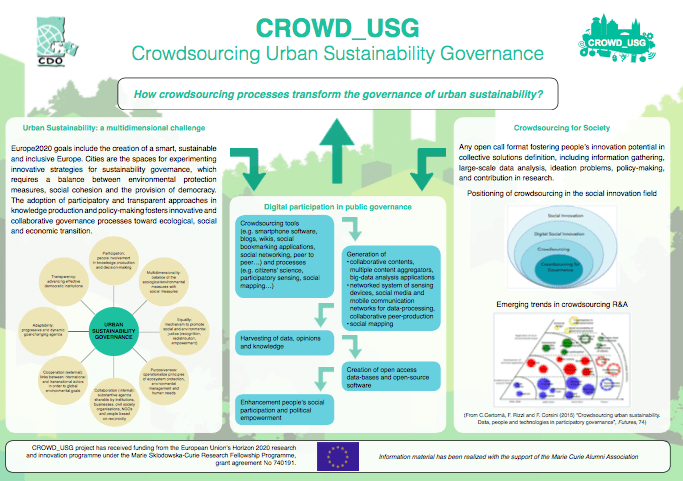
Open Initial Seminar “Crowdsourcing Urban Sustainability Governance”, 15th June 2017, CDO, Ghent (click on the image to browse the presentation)
“Crowdsourcing the city agglomerate for sustainability governance”, presentation at Participatory Urbanism Conference, 7th April 2017, Brussel
UGent Urban Academy, 29th of May 2019 (Dowload here the flyer_of CROWD_USG final seminar)

CrowdsourcingWeek presentation, Lulea March 2018
Crowdsourcing for public governance. Toward spontaneous smartness
CROWD_USG OUTPUTS
Final CROWD_USG project pack
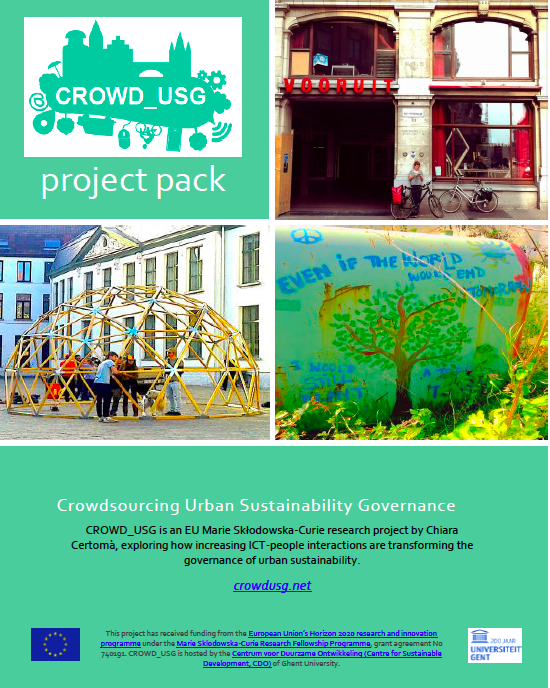
Scenario Building of Crowdsourcing Urban Sustainbility Governance (Download the TAVOLA_digitale)
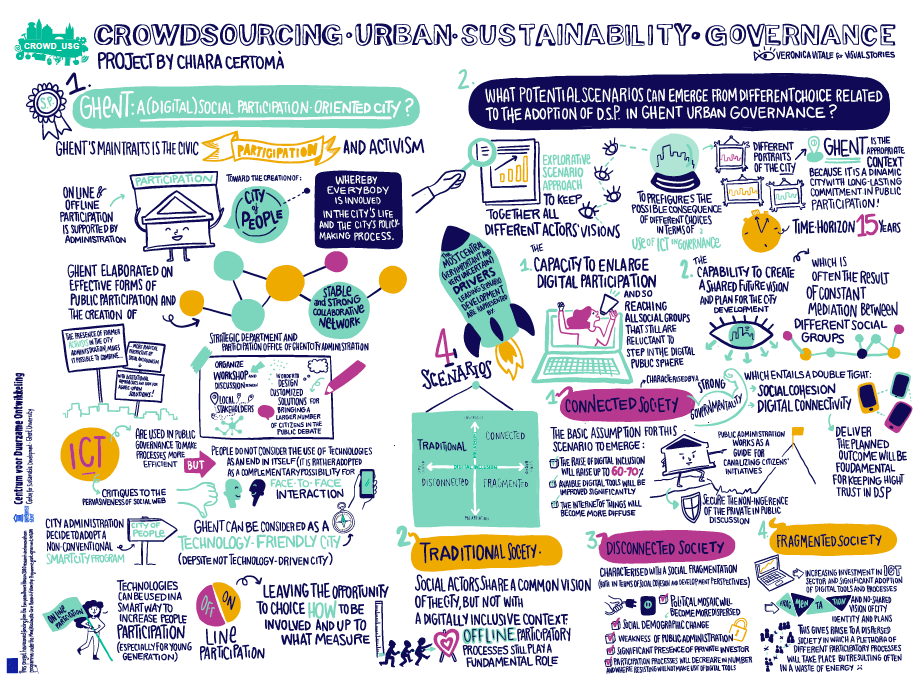
A booklet on policy recommendations and guide for action (Download the high-resolution booklet completo)
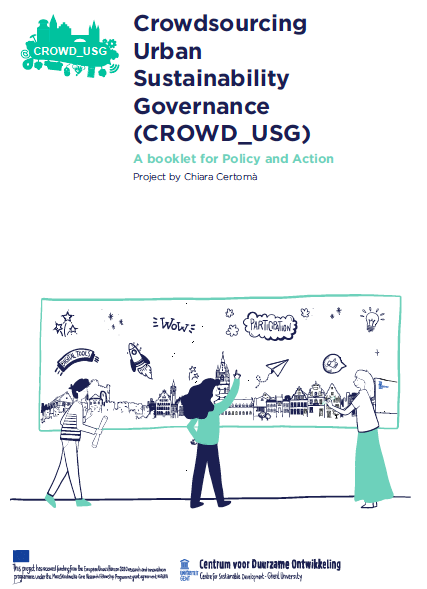
Sustainability, Technology and Participation. Interviews in Gent – CROWD_USG. A few minutes video-resume of the interviews conducted in Ghent to key-informants on using digital participation technologies and processes for urban sustainability governance.
Assemble, mobilise, impact! Gentenaars’way to (digital) social innovation, 25th Nov 2018, presentation at the Dag van de Wetenshp, MIAT, Gent
Results of the interviews about technology-aided participatory processes for sustainability (download here the Progetto – Disegno 1_8)
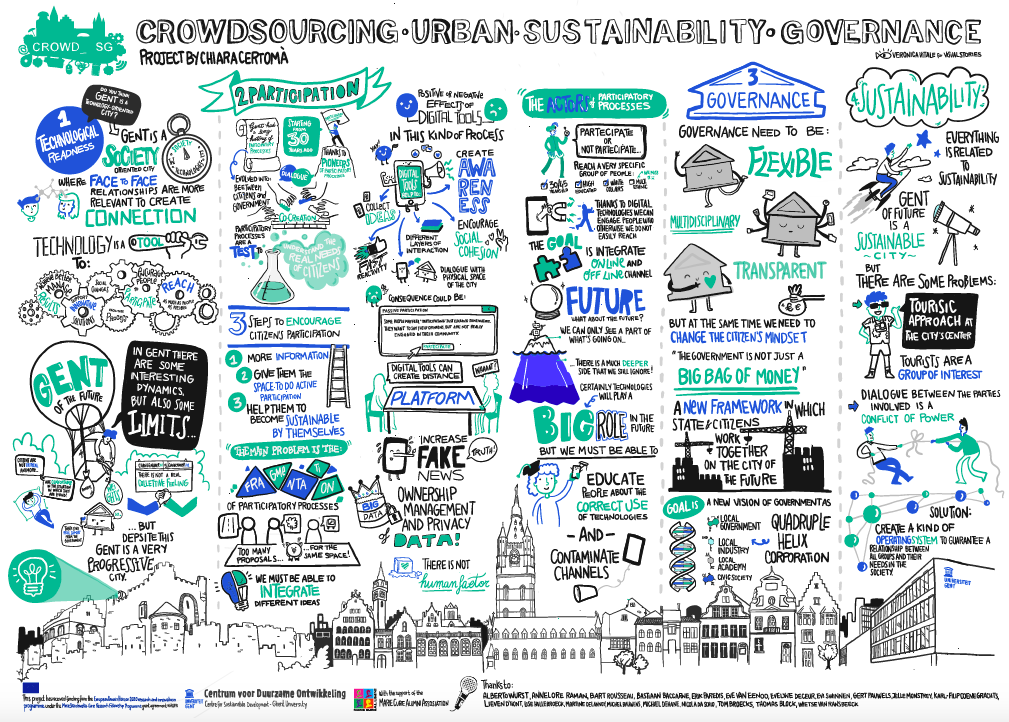
Lecture ” Think about the changes in urban governance brought about by (digital) social participation and innovation for sustainability”, 8th July 2018, U4Summer School “Creating a Climate for Change” , University of Groningen.

Students’ presentation on Ghent case downloadable here: Ghent Case (authors: Abe Hendriks, Petra Meelker, Matthieu Warnier, Violet Oloibiri, Catlin Lhoest)
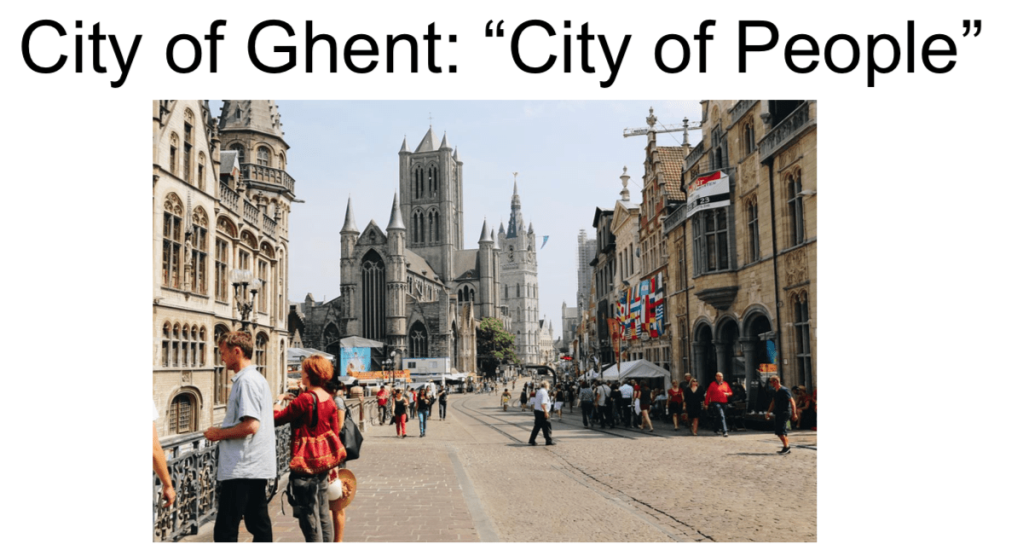
Paper presentation ““Much Ado About Nothing? Crowdsourcing for Public Governance in the European R&I Context” – 21 March 2018, 2:50pm Luleå University of Technology, Conference Room A117 @ Sweden, Luleå 20-22 March: CSW Arctic // Europe 2018
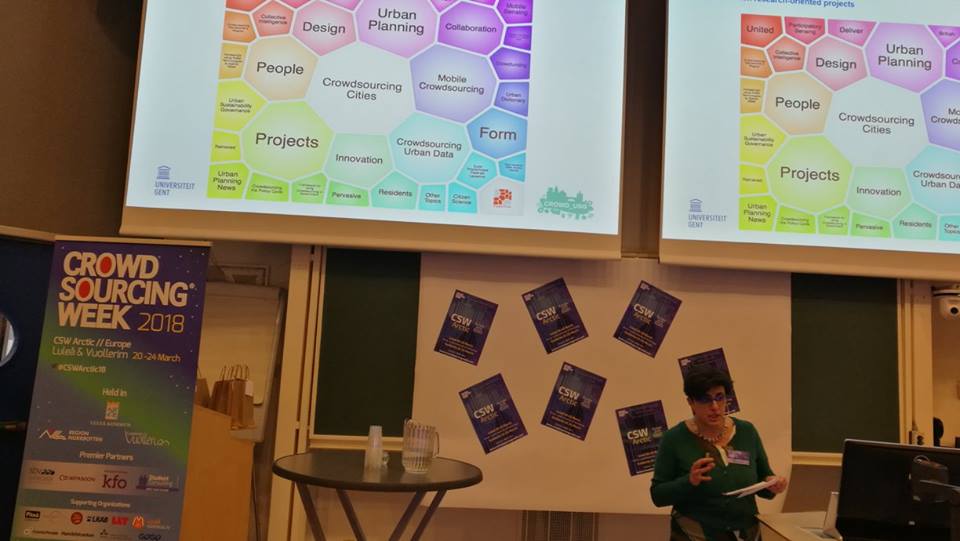
Panel discussion “The New Network Economy – Impact Investment for a Sustainable Society” 21 March 2018, 4:51pm Luleå University of Technology, Conference Room A117 @ Sweden, Luleå 20-22 March: CSW Arctic // Europe 2018

Poster presentation at the 2018 Marie Curie Alumni Association General Assembly Conference and Annual Conference, KU Leuve, February 2nd-3rd
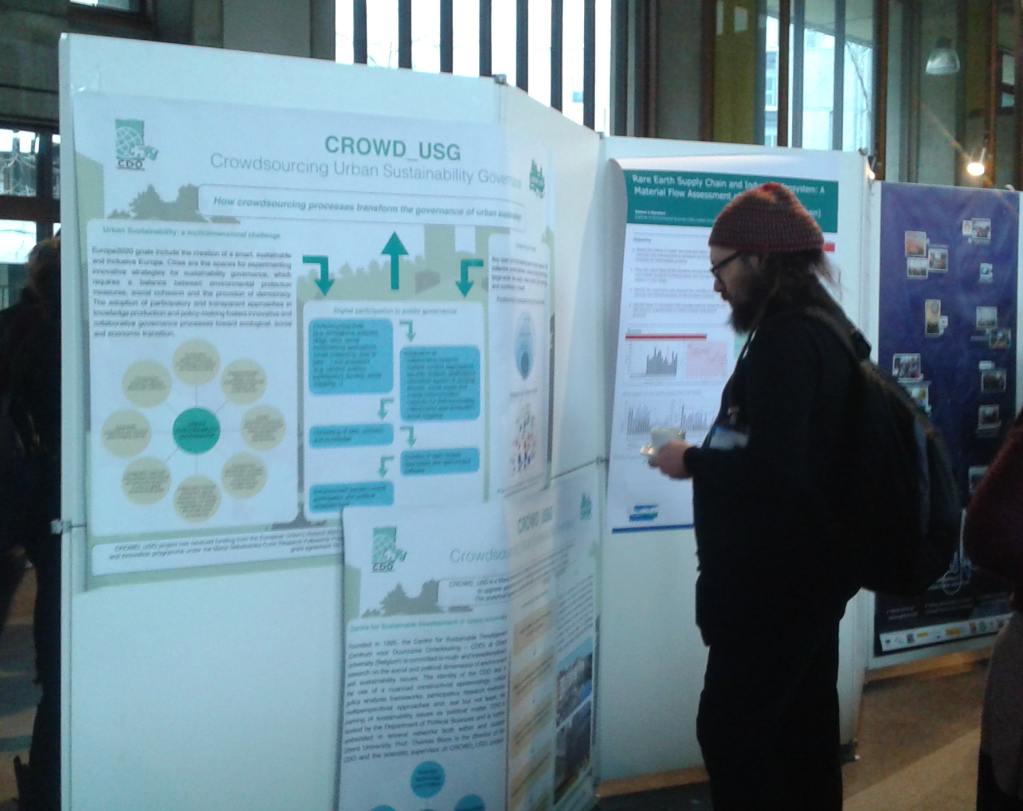
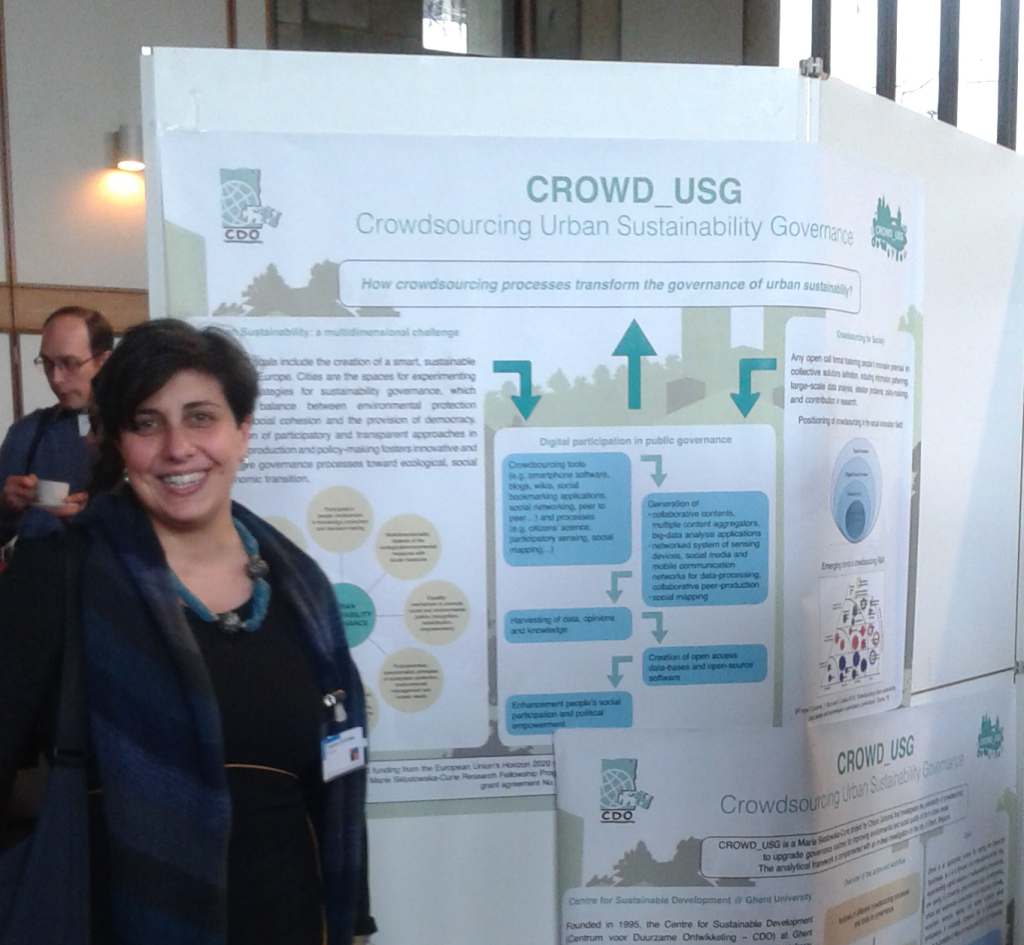
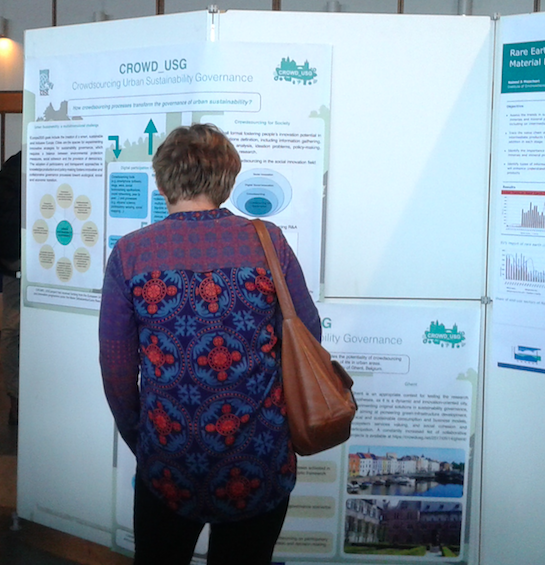
“Vuoi una città più verde? Clicca mi piace e condividi!”. Sostenibilità e partecipazione nel web interattivo, Sant’Anna School of Advanced Studies, September 29th 2017

Open Initial Seminar “Crowdsourcing Urban Sustainability Governance”, CDO – Ghent University, 15th June 2017
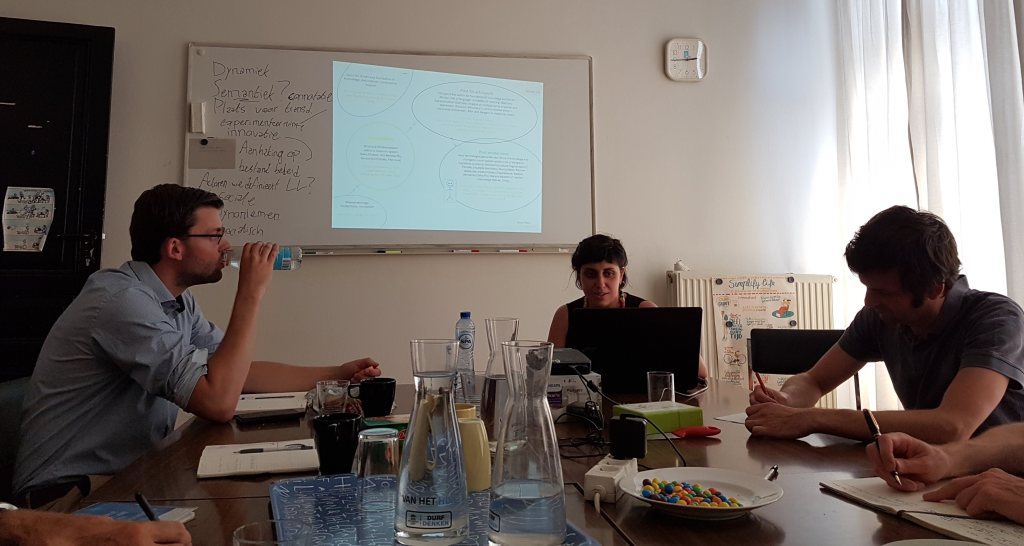
Presentation at “Participatory Urbanism”, COST Action TU1204 “People Friendly Cities in a Data Rich World”, Bruxelles, 6-8 april 2017 (Booklet Collaborative Urbanism Conference)
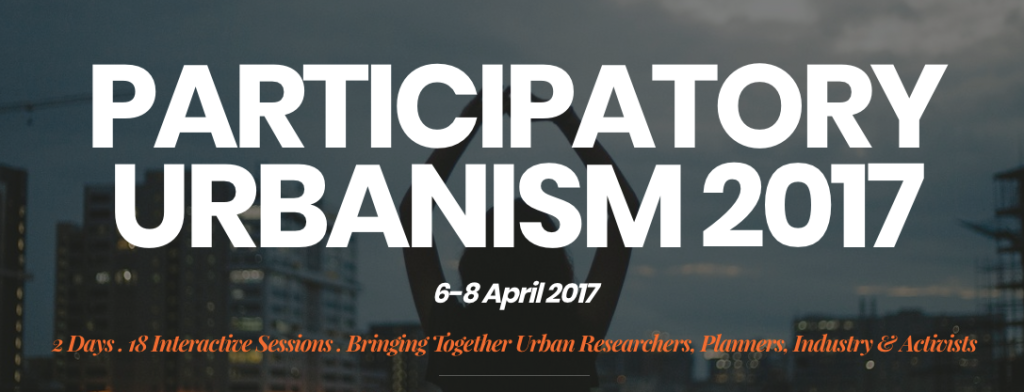
CROWD_USG EVENTS
30 August 2019, RGS-IBG Annual Internation Conference 2019, London, session “Digital democracy: Geographies of trouble and geographies of hope”, Presentation of the paper: Digital Social Participation transforming urban governance. A scenario building exercise in Ghent. The paper explores how the adoption of digital social participation processes (can) impact on the traditional process of urban governance. Specifically, this interrogates the objectives, potentiatlities and consequences of the introduction of technology-mediated participatory processes in the city of Ghent, Belgium, by providing some alternative scenarios for future developments. It has been claimed that DSP processes can enable ordinary citizens to take part in knowledge-production and socio-political decision-making by also encouraging the expansion of public debate and questioning the socio-political underpinning of traditional governance processes, and the formation of political agenda. Crowdsourcing-kind processes (including participation platforms, citizens’ science, participatory sensing, social mapping, e-pulling and similar) have been demonstrated via pioneering experiments to contribute at fostering far-flung genius of social actors in shaping the city organisation and functioning, and at fuelling the emergence of a new governance model characterised by distributed technological agency. On the base of the results of the EU MSCA project “CROWD_USG” we investigate how crowdsourcing affects traditional urban governance processes by prefiguring future governance scenarios that are likely to occur in consequence of the introduction of digital participation technologies in the city of Ghent. Building upon the critical perspective on “internet for society” studies, we evaluate how and whether digital social participation are actually transforming urban governance processes; what opportunities, problems and consequences it brings about; what actors are empowered or excluded; what kind of issues are prioritized and what tools and processes for addressing them are privileged; and in general what are the foreseeable social, environmental or economic consequences.
12the August 2019, Chiara Certomà is now Project Partner at Forum Disuguaglianza Diversità
5th August 2019, 1 pm, F Block, Computer Science Seminar Room, Waikato University, Hamilton, New Zealand, Exploring Digital Social Participation for Urban Governance, The seminar presents the recently concluded Marie Skłodowska-Curie project titled Crowdsourcing Urban Sustainability Governance. This is intended to collectively discuss the potentialities and risks of digital participation in the city planning and management. Digital social participation (DSP) processes are currently widely experimented in many European cities and promise to have a disruptive effect on the tokenistic forms of citizens participation and the traditional governance models. Nevertheless, critical scholars and internet activists recently raised doubts about the actual possibilities, intrinsic limits and external obstacles of technological citizenry and the use of DSP in urban planning, governance and management. The seminar proposes the results of a strategic qualitative scenario building analysis in the city of Ghent, Belgium. This aims at investigating the potential effects of the digital turn on participatory governance; and to explore how different combinations of key-drivers identified by local informants are able to disclose potentialities, pitfalls and consequences of DSP. The resulting scenarios offer a privileged standpoint and a situated perspective for an expert discussion on the currently un-resolved issues brought about by DSP. These include the broadening and transformation of participation meaning and practices; the capability and possibility to govern digital social innovation and participation in a new public-private governance regime; the shift of power geometries and the empowerment mechanisms that can (or cannot) turn the hyperconnected city of futurist technology-optimist narrative into a City of People.
25th June, Marzyciele i Rzemieślnicy, Bracka 25, Warsaw, New Urban Visions: Bringing digital social innovation into City Hall, Discussing the European digital social innovaton index at the final conference of DSI4EU project.
14th June 2019, Cartiera Latina, Parco Regionale dell’Appia Antica, Rome, dalle 16.30 alle 19.00, Coltivare la città. Spazio pubblico, cittadinanza attiva e nuove ecologie urbane
5th June 2019, Consiglio Nazionale delle Ricerche, Rome, Eu-SPRI 2019 Conference “Science Technology and Innovation Policies for Sustainable Development Goals” Presentation of the paper Crowdsourcing as social innovation for urban sustainability governance in Europe
29th May 2019, 2 pm – 4 pm, UGent Urban Academy / Green Hub, Sint-Pietersnieuwstraat 31 (plinth UFO building, next to Arts Center Vooruit), “Exploring Digital Social Participation for urban governance in Ghent” – CROWD_USG Final Seminar – UGent Urban Academy Session, The session is the final event of the Marie Skłodowska-Curie project Crowdsourcing Urban Sustainability Governance and will be introduced by a brief presentation on the project aims, activities and results. The focus of the session is to discuss with you collectively or in two small groups, together with the positive outcomes, also the pitfalls and threats of digital participation in the planning and managing of the city. To this end we will introduce the projects results in the form of provisional conclusions and seek for your help to further explore both the bright and the dark side of digital social participation. We also want to collect and formulate new research questions on digital participation that Master students can discuss within the Urban Academy. Dowload here the flyer_of CROWD_USG final seminar
16.05.2016 NUI Galway University,Cube and Stage venue in Aras na MacLeinn, from 1.45 to 3.15 and 3.45 to 5.15, Presentation “Co-creating, commoning, sharing. Digital participation for urban sustainability governance in Gent”, session “Beyond the Ivory Tower: Bringing researchers and activists together in addressing complex sustainability challenges”,EUGEO2019
Dag van de Wetenshap , Vlandereen, Wooow Science Festival, 25th November 2018, 14:00 -15:00 u. – MIAT, zaal 4.6 Palladium, Assemble, mobilise, impact! Gentenaars’ way to (digital) social innovation, A Pecha Kucha is a presentation of 20×20 seconds. Short and to the point! In this 6’40” presentation Chiara Certomà will tell you everything about a citizen-lead project in Ghent. And… there are more English-spoken Pecha Kucha presentations in this series. You are invited to discover them all! Co-creating, commoning, sharing: a new imaginary of participatory city is rising. Citizen-lead innovative experiences – from consultation to engagement – are impacting city planning, urban metabolism and the governance of socio-environmental sustainability. Interactive web and digital participation processes promise to democratize the mode of interaction between administrations, civil society, research and private actors. Is this happening in Gent? Is the new (digitally-enabled) participatory knowledge and policy-making model transforming the governance of Gent?
29th Aug 2018, RGS- IBG Annual International Conference 2018, Cardiff University,Presentation “Much ado about nothing? A critical investigation of crowdsourcing for urban governance in Europe” in the session Publics In-formation: Re-thinking smart cities, people, and processes organised by Caspar Menkman and Aoife Delaney, Recently academics have taken notice of the limited attention paid to the role of publics in corporate and critical smart city discourses. Despite initial promises of a technologically empowered or ‘smart’ citizenry, the focus has principally been with the powerful, rational, and universal impacts of smart technologies. While these early insights have proven crucial in framing smart cities, their disregard for scholarly work that insists on technological and social complexity means they need to be amended. Therefore, for this session we invite contributions that explore the emergence of publics as (social) interfaces, associations, and borders are reconstituted with the help of smart solutions.
8th July 2018, U4Summer School “Creating a Climate for Change” , University of Groningen, Lecture ” Think about the changes in urban governance brought about by (digital) social participation and innovation for sustainability”
June 6th 2018, 9am-18am, Piccola Promoteca Hall, Campidoglio, Rome, CROWD_USG poster presentation at the Digital Social Innovation Fair 2018,
May, 18th, 2018, 10am -4pm, Legambiente Nazionale, via Salaria 403,National Workshop “Disuguaglianze ambientali – disuguaglianze sociali”, Legambiente Scientific Committee, (in italian) Qual è il rapporto tra disuguaglianze ambientali e disuguaglianze sociali? Di disuguaglianze ambientali se ne è parlato abbastanza a proposito di giustizia climatica e di ecoprofughi, meno quando si è trattato di leggere gli effetti delle emergenze ambientali sui territori del mondo industrializzato, dove si è preferito parlare di “differenze territoriali”. Quello su cui oggi lamentiamo una mancanza di elaborazione concettuale e, quindi, di indicatori quantitativi, è l’insieme di relazioni tra i due fenomeni. Ovvero, quanto le disuguaglianze ambientali (in termini di inquinamento, di libertà di movimento, di accesso alla bellezza, ecc. ecc.) pesano di più sulle fasce più fragili e più povere della popolazione (perché economicamente e culturalmente meno in grado di difendersi, ad es., dagli effetti sanitari nocivi dell’inquinamento), e quanto, all’inverso, le disuguaglianze sociali creano o accentuano problemi ambientali (degrado urbano, trattamento dei rifiuti, …).
21 March 2018, Luleå University of Technology, Conference Room A117 @ Sweden, Luleå 20-22 March: CSW Arctic // Europe 2018, 2:50pm Presentation by Chiara Certomà: “Much Ado About Nothing? Crowdsourcing for Public Governance in the European R&I Context”, Crowdsourcing processes can impact on governance model by restructuring governance models and fuelling the integration of environmental, social and economic priorities in the city. I’m interested in understanding when and how it is adopted in Europe, and whether crowdsourcing fits with the European Commission social innovation and participatory governance strategy. The results presented show how crowdsourcing for public governance is understood in scientific research and research-led projects supported by EC; and how it is actually adopted in local, non research-led projects (supported by networks of cities, local institutions, private associations or CSOs) in Europe. Eventually, I discuss whether, and under what conditions, crowdsourcing can foster virtuous processes of urban sustainability governance via participation social innovation practice. 4:51pm Panel discussion “The New Network Economy – Impact Investment for a Sustainable Society”, Moderator: Kaj Embrén, CEO, CSW Europe, Panelists: Niklas Nordström, Mayor of City of Luleå, Xavier Damman, Founder, OpenCollective, Anna Chojnacka, Founder, GoodUP, Thomas Hörnfeldt, Vice President Sustainability & Public Affairs, SSAB – Swedish Steel Industry, Chiara Certoma, MSCA Researcher, Ghent University and Director of IRTA Leonardo
Feb 2nd 2018, 9am-18am, KU Leuven, Campus Gasthuisberg O&N 2, Herestraat 49, 3001 Leuven, CROWD_USG poster presentation at the 2018 MCAA General Assembly and Annual Conference
Dec 11th 2017, 10am -4pm, Legambiente Nazionale, via Salaria 403,Rome, National Workshop “The challenge of green society. Participation, solidarity, volunteering, welfare, community, new enterprises, beauty, innovation, culture, rights”, (in italian) Seminario nazionale “Le sfide della green society. Partecipazione, solidarietà, volontariato, welfare, comunità, nuova impresa, bellezza, innovazione, cultura, diritti: le parole del cambiamento”, Esiste la green society? In questi anni stiamo assistendo ad una crescita progressiva di tutti gli indicatori economici e sociali che attestano scelte ecosostenibili da parte dei cittadini e, in misura diversa, delle imprese. Ma si può parlare di un tessuto sociale coeso e di qualità, di relazioni comunitarie, di un orizzonte di valori e comportamenti che determinano innovazione sociale verso l’ecosostenibilità? Sapendo che ci troviamo di fronte ad esperienze al confine documentate nel volume Alla scoperta della green society tra aspetti ambientali e aspetti sociali, immerse nei territori, spesso carsiche, di dimensioni ridotte e disperse, cioè non coordinate da qualcosa o da qualcuno, eppure in tutte queste storie si rilancia, in modo forte e radicale, il senso della koinè.
Nov 17th 2017, MSCA Facebook page CROWD_USG presented by fellow of the week Chiara Certomà, find out more below:
Oct 10th 2017, Lund University, Biskopsgatan 5, Lund, Papers presentation and Session organisation at Lund Conference on Earth System Governance , Earth System Governance is the largest social science research network in the area of governance and global environmental change. The Earth System Governance research alliance takes up the challenge of exploring political solutions and novel, more effective governance mechanisms to cope with the current transitions in the biogeochemical systems of the planet. The normative context of this research is sustainable development; earth system governance is not only a question of institutional effectiveness, but also of political legitimacy and social justice, Program of interventions
September 29th, 9-11 pm, Sant’Anna School of Advanced Studies, Aula 3, Pz. Martiri della Libertà 33, Pisa, “Vuoi una città più verde? Clicca mi piace e condividi!”. Sostenibilità e partecipazione nel web interattivo, Speaker: Chiara Certomà, Interactive workshop and visual exploration of forefront experiments in web-based citizens’ participation toward greater democracy and sustainability in European cities.The workshop is organized in the context of the EU Bright Night of Researchers 2017 in collaboration with the Center for Sustainable Development – CDO, Ghent University and the Scuola Sant’Anna – Istituto Dirpolis and Istituto di Management. Informationa material have been realised with the support of Marie Curie Alumni AssociationMarie Curie Alumni Association.
Aug 31st 2017, 4:50 – 6:30 pm, Royal Geographical Society, Lowther Room, London, Making Injustice visible: cross-disciplinary representational techniques and processes of Spatial & Environmental Injustice and Environmental Conflicts, Session at RGS-IBG Annual International Conference 2017, Organisation and Chairing: Chiara Certomà and Federico Martellozzo, Supported by Geographies of Justice Research Group, The section is aimed at improving the theoretical and methodological background to investigate spatial justice via a cross-disciplinary research; in particular we focus on the spatio-temporal distribution of socio-environmental conflicts, on the mix of qualitative and quantitative methods that can proficiently support environmental justice definition/recognition, and on the linkages with policy oriented research.
Since the early ‘70s the debate on spatial justice attracted a broad scholarly interest by showing how the circumstances in which different social groups live play a major role in determining their wealth, opportunity, health outcomes, educational attainment and virtually influence all aspects of life’s quality (Harvey, 1973; 1996; Lefebvre, 1991; Soja, 1989, 2010). The unequal distribution of reseources and possibilities overlaps the unequal economic and social power distribution occurring through the social body (I.M. Young 1990; Haughton, 1999). More recently, social research established that, amongst other burdens, environmental problems are not randomly distributed in space and they do affect some people more than others. The link between spatial justice and environmental issues (Homer Dixon, 1994; Agyeman 2005; Dryzek 1987) engaged scholars’ debate and fueled the disputes regarding its etiology, consequences and controversies. As Agyeman points out (2005), environmental justice has not only to be interpreted from a negative perspective but should also be seen as a proactive tool for accessing and distributing the environmental benefits necessary for sustainable societies with a high quality of life. In order for this to happen, activists, research bodies and the academia shall attempt at providing an accurate, detailed and punctual representation of spatial&environmental injustice (e.g. http://www.politicalecology.eu/) and the related conflicts (e.g. http://www.ejolt.org/).Nevertheless the fuzziness of theoretical definition, together with its breadth (spamming across a vast number of disciplinary fields) made it difficult to fully appreciate the multilayered and cross-scalar consequences of spatial injustice, most notably the socio-environmental conflicts. The narrative and the representation of spatial&environmental injustices and subsequent conflicts through geographic, qualitative and quantitative data (which can prove to be reliable, scientifically accurate and complete) is of capital importance for a full consideration in both academic debate, and in decision support system and policy-making processes.
June 15th, 2.30 pm, CDO, Seminar Room, Poel 16, 9000, Ghent, CROWD_USG. Crowdsourcing urban sustainability governance. Open initial seminar, Speaker: Chiara Certomà, CROWD_USG is a Marie Skłodowska-Curie research project exploring how ICT-people interactions are transforming the governance of urban sustainability. Cities are increasingly depicted as the appropriate loci for tackling with a number of interrelated and complex issues – ranging from protecting the environment, to incubating innovation and granting social justice. The socio-technological networks, which progressively emerged for addressing the related tasks, are now significantly changing the traditional forms of urban governance. In these contexts, technologies are often presented as both facilitators and drivers of changes. Nevertheless, the assumption that broadening technological access will lead to people’s empowerment and make participation effective is questionable.CROWD_USG project investigates under what conditions crowdsourcing (i.e. any open call format toward collective solution seeking by a large network of users) can actually turn governance processes into open and shared opportunities for advancing socio-environmental sustainability in the city. This seminar presents the background, motivations, scope and expected results of the project, by exploring current scientific production and forefront applications of participatory ICTs toward urban sustainability. Theoretical and methodological approach are open for discussion with colleagues, in reference to the case of Ghent., Event on CORDIS, Event on MCAA and on MCAA calendar, Event on DG Research&Innovation
Jun 8th 2017, Scuola di Lettere Filosofia Lingue, Università Roma Tre, Via Ostiense 234-236, Roma, Giustizia spaziale, conflitti ambientali e loro rappresentazione, Session at XXXII Congresso Geografico Italiano, Organisation and Chairing: Chiara Certomà and Federico Martellozzo. La sessione si concentra sull’analisi del contesto teorico e metodologico per l’analisi della teoria della giustizia spaziale; in particolare vuole offrire un momento di riflessione condivisa sulla distribuzione spazio-temporale dei conflitti socio-ecologici, e sulle metodologie quali-quantitative che possono essere utilizzate per la definizione e l’osservazione di fenomeni di ingiustizia spaziale e con la ricerca sulle politiche volte alla loro risoluzione.
CROWD_USG NEWS
(17/12/2018) CROWD_USG videos on AGEI – Association of Italian Geographers website
(7-9/02/2018) Chiara Certomà is respondent at the U&U – 9th edition of the PhD Seminar in Urbanism & Urbanization, Gent University, Department of Architecture & Urban Planning. Visual impressions of the event available here U&U-PhD Seminar
(17/11/2017) CROWD_USG is the project of the week on Marie Skłodowska-Curie Actions facebook page
(25/10/2017) CROWD_USG special guest at Gert Pauwels’ presentation “Voordracgt: Hoe SMART zijn we in Gent?” hosted by Digitale Week in Gent
(6/9/2017) Chiara Certomà joined the COST Action CA15212 Citizen Science
(4/7/2017) CROWD_USG is now an affiliated project at the Earth System Governance Project; Posted on Earth System Governance
(15/6/2017); CROWD_USG included in “De Commons in Gent” mapping project; Posted on gentCommonsWiki
(25/5/2017); CROWD_USG entered the Digital Social Innovation network; Posted on Digital Social Innovation.
(10/4/2017) Borsa Marie Skłodowska-Curie a Chiara Certomà per un progetto su crowdsourcing e città sostenibili; Posted on Leonardo-Irta.it.
(07/04/2017) Partecipatory Urbanism 2017, il 7 aprile l’intervento della direttrice di IRTA-Leonardo, Chiara Certomà; Posted on Leonardo-Irta.it.
(27/03/2017) Project reference on EU Cordis; Posted on Cordis.
(26/03/2017) Are Information and Communication Technologies (ICT) Driving Transformation of Landscapes and Taking Shape in Local Governance Structures? Sant’Anna Dirpolis and Management Institute Researcher Receives EU Funding; Posted on Sant’Anna Magazine
CROWD_USG NETWORK
Crowdousourcing and digital social participation
Foreplay: Technology in the city of people
Indienet – Aral Balkan on Gent
Gent Smart City- Eurocity 2013
Off line participatory initiatives
Commons transition in Gent – P2P Foundation
WATT Factory (see Gent, a true city of people note)
Dienst Beleidsparticipatie – Gent Stad
Strategische Coordinatie – Gent Stad
CIVITAS Award for Public Participation
Gent City of People now City of People
Urban Sustainability
UGent Sustainable Energy Technologies – SET
Ghent toward a sustainable city
Dienst Milieu en Klimaat -Gent Stad

Logo by Andrea Certomà
